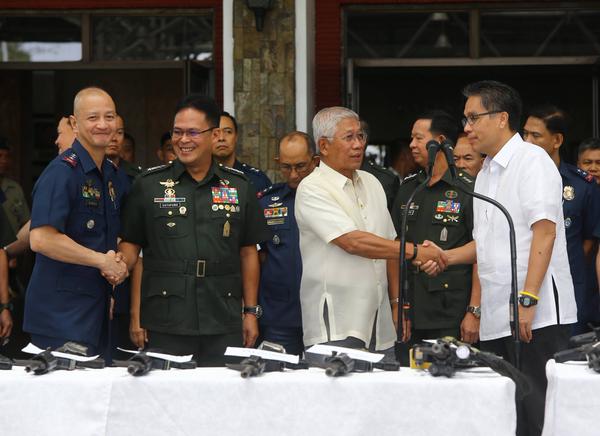The Philippine National Police (PNP) and Armed Forces of the Philippines (AFP) affirm support for passage of Bangsamoro law, stated in a release dated February 12, 2015 by the Philippines government press office (Office of the Presidential Adviser on the Peace Process).
Expressing the apprehensions of people from Mindanao that the passage of the Bangsamoro Basic Law will be delayed or scrapped off in the wake of the unfortunate incident in Mamasapano, Maguindanao House of Representatives’ Deputy Speaker and Lanao del Sur second district Representative Pangalian Balindong asked top police and military officials if they support the passage of the BBL as a way forward in achieving peace. ?
To this, both Philippine National Police officer-in-charge Deputy Director Leonardo Espina and Armed Forces of the Philippines (AFP) Chief of Staff General Gregorio Catapang responded “yes” and affirmed their support to the passage of the BBL during the HOR’s first public hearing on the Mamasapano incident that claimed lives of policemen, armed rebels and civilians.
Balindong, a Muslim, appealed that the “peace process should continue so our [referring to the people of Mindanao] hearts may be at ease.”
He urged the conduct of an “uninterrupted review of the BBL” parallel to the Congressional probe on the Mamasapano incident.
For her part, Presidential Adviser on the Peace Process Teresita Quintos Deles said that the passage of the BBL is? really in the hands of Congress and expressed her respect to the power of the body to legislate a law that will address the aspirations of the Bangsamoro people.
The passage and ratification of the BBL shall establish a Bangsamoro government that will exercise genuine autonomy, and replace the Autonomous Region in Muslim Mindanao. The BBL is the enabling law of the Comprehensive Agreement on the Bangsamoro (CAB) signed by the Government of the Philippines (GPH) and the Moro Islamic Liberation Front (MILF) on March 27, 2014. The CAB also provides a normalization process that includes decommissioning of the MILF weapons and forces, simultaneous to the establishment of the Bangsamoro.
Earlier, Espina emphasized in a very emotional manner that, “we [the PNP] are for peace, we are first and foremost your peacemakers. Whatever it takes to attain the peace, let us do it po?.”
Implication of non-passage of BBL
In response to a question from Caloocan City second district Rep. Edgar Erice on what will be the effect on the ground if the BBL will not be passed into law, Catapang pointed out the security repercussions.
According to the AFP chief, government forces and MILF had a zero skirmish record for three years since 2012 until this year when the tragic incident in Mamasapano happened due to the ceasefire accord.
However, Catapang noted that in the past, encounters between the government and MILF forces from 2001 to 2012 resulted to: 491 deaths among AFP and PNP; 841 deaths among civilians; and 1,267 deaths among MILF members. The record for the wounded were 1,089 among AFP and PNP; 1,673 for civilians; 237 for the MILF.
Catapang expressed, “Pahihintulutan po ba natin na mangyari at maulit ito kung hindi natin itutuloy ang national endeavor na magkaroon ng kapayapaan? [Do we allow this to happen again if we do not continue the national endeavor of achieving peace?]”?
Deles on her part said, “Your honor we already know what the situation is when there is no ceasefire. I thank Gen. Catapang for already having stated that. I think your honor it also has some implications on what we tell our people about our capacity to be able to make peace. What it tells our people about our capacity to fulfill a constitutional mandate on autonomy.”
She cited the wisdom of the framers of the 1987 Philippine Constitution. Fourteen surviving members of 1986 Constitutional Commission signed last February 9 a statement supporting the creation of the Bangsamoro, as consistent with the constitutional mandate to create an autonomous region in the south. With this Deles said, ”I think we disappoint ourselves, I think we fall down on ourselves, if we cannot show that we can rise to that [constitutional mandate].”










